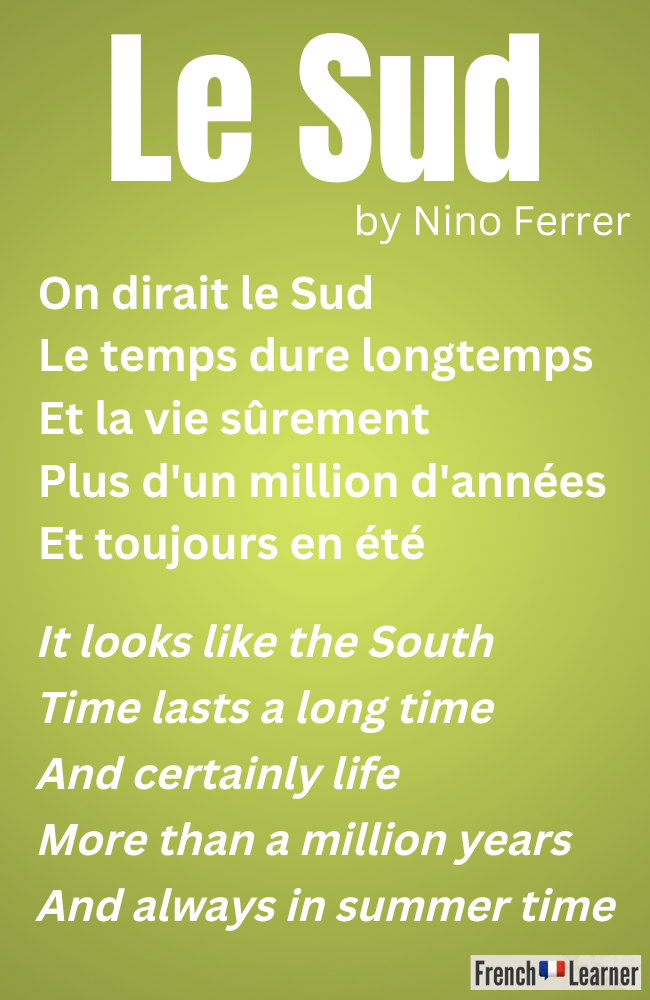Le Sud (Meaning: The South; Pronunciation: lə syd) is a song released by French singer Nino Ferrer in 1975. The song was the biggest hit of Ferrer’s career and one of the top French hits of the 1970s. This post provides unique line-by-line insight in to the vocabulary and grammar of the lyrics.

Song overview
In the song, Le Sud, Nino Ferrer describes an idyllic summer-like setting where kids and dogs play in the backyard of a house. He states the setting is in Italy but look like Louisiana.
The song ends on a sad note where Ferrer says that while it would have been nice to live in this setting, an eventual war will inevitably take place.
We believe this war reference could be related to the Vietnam war which was coming to an end at around the time of the release of this song.
Listen to Le Sud
The official YouTube video for Le Sud has over 64 million views.
You can also listen to Le Sud on Spotify:
Lyrics analysis
In the following section we’ve analyzed lines from the song which we believe offer interesting insights into learning French.
C’est un endroit qui ressemble à la Louisiane, À l’Italie
This line translates to “It’s a place that looks like Louisiana, In Italy”. C’est means “it’s” in French. This page on our site covers c’est in detail. Qui is a relative pronoun meaning “which” or “that”.
The verb ressembler means to resemble or look like. Both la Louisiane and l’Italie are feminine. This page covers names of countries in French.
Il y a du linge étendu sur la terrasse, Et c’est joli
These lines translates to “There is laundry hanging on the patio, and it’s lovely”. The adjective étendu is related to the verb étendre, which means to means both to spread out and hang (for clothing).
Terrasse has multiple meanings in French including patio, porch outdoor dining area of a restaurant. Joli means pretty in French. This page covers various ways of how to say beautiful in French.
On dirait le Sud
This line translates to “It looks like the South”. On dirait translates literally to “one would say”. The personal pronoun on has many meanings in French including “one”, “we” and “people” in general.
This line is in the conditional or “would” tense. The expression on dirait means “it looks like” or “it seems like”.
Le temps dure longtemps
This line translates to “Time lasts a long time”. Temps in French translates to both “time” and “weather”. This page covers weather expressions in detail. The verb durer means “to last” or “to go on”.
Et la vie sûrement, Plus d’un million d’années
These two lines translate to “And certainly life, More than a million years”. The adjective sûr translates to both sure and safe. By adding an -ent, the adverb sûrement translates to surely and certainly.
Année means year in French. This page covers an vs. année, the two ways to say year in French.
Et toujours en été
This line translates to “And always in summer time”. The word été has two unrelated meanings in French. In this line it means “summer”. Été is also the past participle of the verb être (to be), meaning “was”.
Il y a plein d’enfants qui se roulent sur la pelouse
This line translates to “There are lots of children rolling around on the lawn”. Il y a in French translates to there is, there are and ago.
In French, beaucoup de means “a lot of”. The expression “plein de” is a synonym and also means “a lot of”. The reflexive verb se rouler means to roll around. There are two words for lawn in French: pelouse and gazon.
Il y a plein de chiens, Il y a même un chat, une tortue, des poissons rouges
These two lines translate to “There are are lots of dogs, There’s even a cat, a turtle, some goldfish “. Chien means dog in French and chat means cat in French. This page on our site offers a complete list of French animal words.
Il ne manque rien
This line translates to “Nothing is lacking”. The verb manquer translates literally to “to lack”. It is also used to say “I miss you” in French.
Rien translates to both “nothing” and “anything”. We explore this word on our French negation rules page.
Un jour ou l’autre il faudra qu’il y ait la guerre
This line translates to “Someday there will have to be a war”. The expression un jour ou l’autre translates literally to “one day or the other” and means “someday”.
Il faudra is the futur simple (a commonly used French future tense) of the impersonal expression il faut, which has a wide variety of translations and usages including to “it’s necessary”.
Ait is the subjunctive form of the verb avoir (to have). The subjunctive mood is used to express wish, emotion and doubt.
On le sait bien, On n’aime pas ça, mais on ne sait pas quoi faire
These two lines translate to “You know very well, You don’t like it, but you don’t know what to do”. The le in this line is a direct object pronoun, meaning “it”.
The personal pronoun on in this line can mean “you” or “people” in general. The verb aimer means both to like and to love.
Ça means both “it” and “that” in French and is used to make reference back to a previously mentioned topic or idea. In this context of this line, ça is referring back to la guerre (war).
On ne sait pas quoi faire can translate to “people don’t know what to do”. Ne + verb + pas is the most basic form of French negation.
The word quoi translates to “what” and has multiple usages. Faire means both “to do” and “to make” in French.
On dit, “c’est le destin”
This line translates to “People say, it’s destiny”. Destin can translate of destiny or fate.
Tant pis pour le Sud, C’était pourtant bien
This line translates to “Oh well for the South, It was nice”. The expression tant pis translates to “to bad” or “what a shame”. Était is the imperfect (imparfait) form of the verb être (to be). The French imperfect tense is used for making descriptions of past events.
Pourtant has translates mainly to “yet”, “though” and “however”. Bien means “well” but can also mean “good”.
On aurait pu vivre
This line translates to “We could have lived there”. Aurait pu is the past conditional tense of the verb pouvoir (can, to be able), meaning “could have”.
There are two ways to say “to live” in French: habiter and vivre. The verb vivre is use more to refer to living during time periods and being alive.

Le Sud French Lyrics & English translation
C’est un endroit qui ressemble à la Louisiane
À l’Italie
Il y a du linge étendu sur la terrasse
Et c’est joli
It’s a place that looks like Louisiana
In Italy
There is laundry hanging on the patio
And it’s lovely
On dirait le Sud
Le temps dure longtemps
Et la vie sûrement
Plus d’un million d’années
Et toujours en été
It looks like the South
Time lasts a long time
And certainly life
More than a million years
And always in summer time
Il y a plein d’enfants qui se roulent sur la pelouse
Il y a plein de chiens
Il y a même un chat, une tortue, des poissons rouges
Il ne manque rien
There are lots of children rolling around on the lawn
There are are lots of dogs
There’s even a cat, a turtle, some goldfish
Nothing is lacking
On dirait le Sud
Le temps dure longtemps
Et la vie sûrement
Plus d’un million d’années
Et toujours en été
It looks like the South
Time lasts a long time
And certainly life
More than a million years
And always in summer time
Di-di, di-di, di-di, di-di
Di-di, di-di, di-di, di-di
Di-di, di-di, di-di, di-di
Di-di, di-di, di-di, di-di
Un jour ou l’autre il faudra qu’il y ait la guerre
On le sait bien
On n’aime pas ça, mais on ne sait pas quoi faire
On dit, “c’est le destin”
Someday there will have to be a war
You know very well
You don’t like it, but you don’t know what to do
People say, “it’s destiny”
Tant pis pour le Sud
C’était pourtant bien
On aurait pu vivre
Plus d’un million d’années
Et toujours en été
Oh well for the South
It was nice
We could have lived there
More than a million years
Always in the summer
Discover more classic French songs:
- Top French songs of all time
- Et Si Tu N’Existais Pas (by Joe Dassin)
- Les Champs Élysées (by Joe Dassin)
- Dominique (by the Singing Nun)
- Tous Les Garçons Et Les Filles (by Françoise Hardy)
- Joe Le Taxi lyrics (Vanessa Paradis)
- Je T’aime…Moi Non Plus (Serge Gainsbourg)


